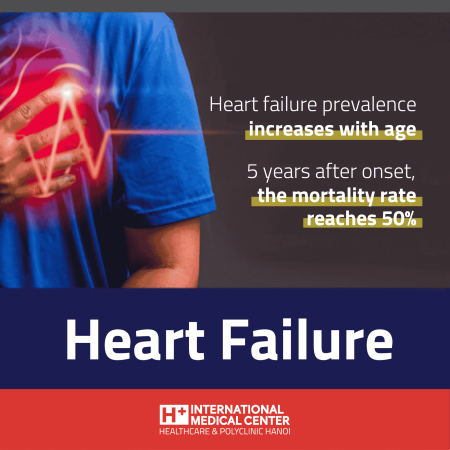The human heart beats more than 100,000 times a day, tirelessly pumping blood throughout the body. However, when the heart is impaired for any number of reasons, cardiovascular diseases can develop and lead to serious complications.
Heart failure occurs when the heart cannot pump enough blood to meet the body’s needs. It is an extremely dangerous condition, with a five-year survival rate lower than that of breast or colon cancer.
To better understand heart failure, H PLUS International Medical Center invites you to explore the information below.
Heart failure – A silent killer
International studies show that heart failure patients face reduced life expectancy and quality of life, with mortality rates increasing sixfold over the past 40 years. The annual mortality rate ranges from 5–10% in mild cases to 30–40% in severe cases.
Notably, the five-year mortality rate after diagnosis can reach 67%, with a one-year mortality rate of 25%, exceeding that of many cancers. The risk increases further after each hospital readmission.
Although Vietnam lacks detailed epidemiological data on heart failure, based on the global prevalence rate (approximately 2% of the population), an estimated 1.6 million people in Vietnam may be living with the disease.
A significant concern is that many patients tolerate the condition without recognizing its severity, assuming that symptoms are simply due to aging. This highlights the urgent need for early diagnosis and treatment. Unfortunately, public awareness of heart failure remains limited, and many patients go untreated until it is too late.
What causes heart failure?
Heart failure results from structural and functional abnormalities in the heart that impair its ability to pump blood. Often referred to as the “end stage” of heart disease, it can develop from chronic conditions such as myocardial infarction (heart attack), high blood pressure, and other heart diseases.
It may also stem from coronary artery disease, valvular disorders, arrhythmias, or cardiomyopathies. More recently, an increase in heart failure linked to obesity, metabolic syndrome, and diabetes has become a concern. Obesity raises blood fat and glucose levels, causing chronic inflammation and damaging the heart muscle and blood vessels.
Heart failure can also develop due to age-related decline in heart function, even in the absence of other diseases.
As heart failure progresses, the body’s organs receive insufficient blood flow, leading to fluid buildup in the heart and resulting in swelling in the ankles and legs. In advanced stages, patients may experience severe breathing difficulties, even while climbing stairs or lying down at night.
Diagnosis and treatment of heart failure
Diagnosis
Heart failure is a progressive disease. The later it is detected, the worse the prognosis becomes. Early detection and timely treatment can ease symptoms and minimize the disease’s impact on health and daily life.
If heart failure is suspected, doctors may order tests such as blood pressure measurement, blood tests, electrocardiograms (ECG), and echocardiograms. Depending on the condition, additional tests such as stress tests, CT scans, or MRI may be used for further evaluation.
Treatment
Heart failure is typically managed with medication, which reduces cardiac workload and improves blood circulation. Common drugs include ACE inhibitors, beta-blockers, diuretics, digitalis, and vasodilators.
Comorbidities such as hypertension, diabetes, atrial fibrillation, chronic kidney disease, chronic obstructive pulmonary disease (COPD), and anemia should also be treated concurrently. Medication is essential even if symptoms improve or the left ventricular ejection fraction (LVEF) improves on echocardiography.
In advanced cases, surgical options may be considered, including heart transplantation, valve surgery, or implantation of assistive devices (e.g., artificial heart pumps).
Prevention
Maintaining a healthy lifestyle is crucial in preventing heart failure, including stress and blood pressure control. Regular aerobic exercise—such as jogging, cycling, or swimming at least three times per week—significantly reduces the risk.
Heart failure patients should limit salt intake to no more than 7–8 grams per day and avoid high-sodium foods like soups, bread, and instant noodles.
Cardiovascular Department at H PLUS – Comprehensive heart care
As part of our mission to become a leading center for cardiovascular care, H PLUS International Medical Center is proud to offer a team of highly experienced cardiologists.
We are equipped with state-of-the-art diagnostic tools, including 2D and 3D echocardiography, ECG, Holter monitors, and stress ECG systems—ensuring accurate diagnosis and effective treatment.
—
Phòng khám Đa khoa Quốc tế H PLUS | H PLUS International Medical Center
“Y học tiên phong – Song hành cùng y đức” | “Excellence in Medicine – Compassion for humanity”
📍 Tầng 7–8, Tòa nhà Văn phòng A, Lotte Mall Tây Hồ, 272 Võ Chí Công, Hà Nội
🌐 Zalo OA: https://zalo.me/hplushn
🌐 Kakao Talk: https://pf.kakao.com/_AcWun
📝 Đặt lịch nhanh: https://forms.gle/8t84zLGVjw4gJQei9
 +84 24-7306-9889
+84 24-7306-9889  Booking
Booking 



